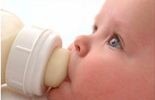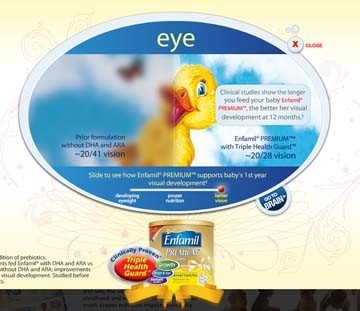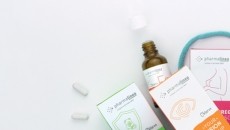Breast may be best but don’t block omega-3 infant formula claims, says practitioner

Writing in the Annals of Nutrition and Metabolism, Berthold Koletzko PhD, MD, from the Division of Metabolic and Nutritional Medicine at the University of Munich Medical Centre in Germany, said blocking the EFSA-approved claim would be detrimental to the health of infants and babies.
“Preventing communication of scientifically assured benefits of optimised products bears the risk that it may slow or even stop the significant quality improvements of foods for infants that has occurred over the last decades in numerous single steps, and which has led to large benefits for child health,” Dr Koletzko wrote.
“Therefore, it is truly important that science and not lobbying prevails in this matter.”
The long-running issue revolves around a 2009 Mead Johnson European Food Safety Authority (EFSA) health claim approval for its Enfamil Lipl product that read: “DHA intake contributes to the visual development of infants up to 12 months of age.”
The final claim related to infant formulas and follow-on formulas that contained 0.3 per cent DHA of total fatty acids.
The claim was approved at European Commission level but this month a European Parliament committee voted 30 votes to 28 that the Parliament should not authorise it. The full Parliament is due to vote on the claim in its April 4-7 session next month.
Dr Koletzko said the influential breast milk lobby group, Baby Milk Action, had effectively lobbied MEPs with what he called “pseudo-scientific” arguments.
He pointed to the fact that EFSA’s health claims panel had evaluated 43 scientific studies including 13 randomised clinical trials in handing in its opinion.
“It is very surprising and disturbing that the members of the European Parliament find such a profound scientific evaluation by an independent body less convincing than the arguments of a loud-mouthed lobbying group,” he wrote.
Breast is best?
He said safety concerns highlighted by the parliamentarians were not supported in the scientific literature and noted the support for DHA fortification from groups including the World Health Organization, the Child Health Foundation, the European Association of Perinatal Medicine, the European Society for Clinical Nutrition and Metabolism, the European Society for Paediatrics and the French Food Safety Authority.
“Perhaps one might question whether there should be any health claims made for infant food products, since breastfeeding is clearly considered the optimal form of infant feeding which therefore must be strongly protected, promoted and supported.
However, not all infants are fully breastfed during the first half year of life and partially breastfed thereafter. For these infants, safe infant formulae of the highest possible quality are required, and health care professionals and families should be able to receive appropriate information on their characteristics.”
Consensus
MEPs including the British Labour MEP Glenis Willmott have disputed the EFSA opinion, believing there is not enough scientific consensus on the effect DHA (docosahexaenoic acid)-fortified baby milk has on infants.
“The European Commission has authorised this health claim, but independent studies say there is no proven link between artificially added DHA and eyesight, and some studies have found possible negative effects of DHA supplementation,” Willmott said.
“If an ingredient is genuinely found to be beneficial and risk free then it should be obligatory in all formula milk, and not be used as a marketing ploy by a specific brand.”















